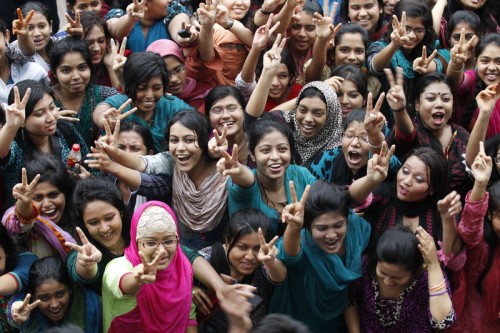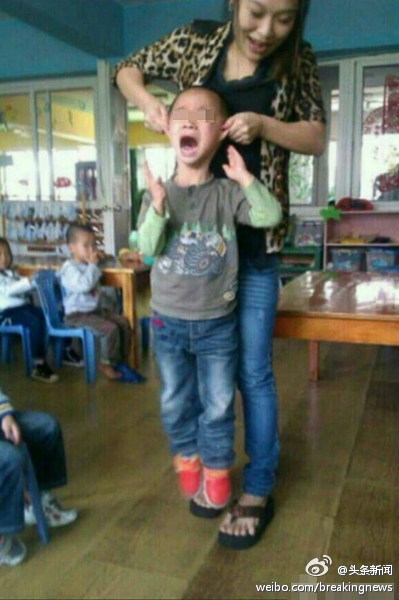A high-school student discovers a math formula in Afghanistan. The cry of resistance from Brazil's indigenous Guarani Kaiowá gains global support. The banned film “V for Vendetta” is screened on China's state broadcaster.
Social media around the globe has been buzzing with important stories that have been missed by mainstream media, and we've been filling that void all year. Here are some highlights from Global Voices in 2012.
Stories of strength
Our special coverage, “Reformists on Trial in Saudi Arabia” gave readers a rare glimpse into court proceedings in the Kingdom and the brave activists who are challenging the arbitrary nature of their judicial system.
In Bangladesh, despite obstacles, girls outshine boys in national exams.

Women celebrate and show the victory sign following the announcement of exam results. Image by Bayazid Akter. Copyright Demotix
In Trinidad and Tobago, one man's hunger strike against a proposed highway, brought the whole country together:
History will show that a tipping point was reached in terms of the necessity for all governments to be transparent about the development path on which they embark. WE may or not support the highway but, surely, we support the right to know what is being done in our names.
In Mauritania, a government employee was celebrated when he locked three Chinese investors in his office and called the police, after they tried to bribe him.
In Russia, from the rooftop of one of the country's most notorious detention facilities, prisoners began a revolt waving banners, “help us please.”
Alternative narratives
Through out the year, we tried to unravel Africa's tainted global media coverage. We gave context to conflicts in the region, and challenged existing narratives of Africa, through stories like “Angolan Tourists Spend Big Bucks in Portugal.” Posts like “Chinese Mining Boss Allegedly Killed by Striking Workers in Zambia” were published along with China in Africa: The Real Story.
In Myanmar we covered a violent crackdown on Monks protesting a China-backed mine:
Now, they burn sleeping monks at 3 a.m. and still claim it's for the rule of law, like a fool.
Our special coverage of Myanmar's Rohingya, gave voice to perspectives from the Rohingya, the Rakhine and from across the border in Bangladesh.
In Hong Kong, growing pressure from China was seen in a new curriculum on “national education” and a leading English newspaper turning red.
During the Israel-Gaza Conflict 2012, online citizen media helped reveal human realities of war on both sides of the conflict.

“I shall not hate” reads a sign carried during an anti-war protest in Tel Aviv. Photograph shared by @RoniMore1 on Twitter
We showed Israelis protesting the military operation against Gaza and the changing dynamics of social media warfare:
Innocent people are dying on all sides, and the IDF wants to reward people for tweeting about it … It makes me sick.
Our Olympic coverage, amplified citizen voices on Saudi's first female Olympic athletes, Tajikistan's female boxer who fought all odds to win a bronze medal and Brazil's sexist reporting of the Olympics.
This August, some Ecuadorian netizens criticized the government's decision to grant asylum to the founder of Wikileaks:
they talk so much about freedom of expression when in our own country IT DOESN'T EXIST!
In Spain, thousands took to the streets to support protesting miners chanting, “yes, yes, they do represent us!”
Through our special Europe in Crisis coverage, we gave voice to the ordinary people living with the social, political and financial consequences of Europe's financial bailouts.
We covered global views on Obama's Re-election including reactions from the Arab world as US drones hit Yemen a day after Obama won the 2012 US election.
Social media, the good, the bad and the ugly
While Psy's Gangnam Style hit the 1 billion view mark on YouTube, breaking all viral records, we covered reactions from South Korea about the unexpected global success of Korean-Pop. We also covered an activist being sentenced to jail for a tweet and confessions made by paid political trolls in the country.
In India, social media was blamed for fueling unrest in Assam and there was outrage after a Facebook post lead to arrests in the country.
Cambodia banned Internet cafes near schools, because the “internet poses numerous dangers such as terrorism, economic crimes & distribution of pornography.”
Despite low internet penetration, Mauritanians found a voice online in 2012 and drew the world's attention to their country.
In Russia, we saw the Internet blacklist in action and mass protests which constituted some of the greatest social turbulence to visit Russia in more than a decade.
Ecuador created an electoral ‘Code of Conduct’ for social media for the upcoming 2013 elections.
While Iranian national TV was broadcasting religious programming, social media became the main source of news on an earthquake that killed more than 250 people in eastern Iran. This year repressive tactics against Iran's bloggers and netizens continued.
Shocking abuse photos from a classroom in China went viral on the country's micro-blogging site Weibo, proving the need for a child protection law in China.
In Spain, a video showing Catalonia's police beating a minor went viral and resulted in calls for the Minister of Interior to resign. This summer, thousands of Catalan-speaking netizens celebrated the fact that Twitter finally speaks their language. And our extensive coverage of the region tried to address why Catalans want independence from Spain.

Pro-independence rally on Via Laietana (Barcelona) on September 11, 2012. By Lohen11 on Wikimedia Commons (CC BY-SA 3.0)
Syrian rebels turned to the world wide web for combat training and a movement to save Syria's threatened heritage sites started online.
In our special coverage Sudan Revolts, blogger and Global Voices author Maha Elsanosi vividly described her three days of interrogation at the National Intelligence and Security Services:
One interrogator said to me: “Take a good look at the window, this will be the last time you ever see the sun.”
Capturing a changing tide
A year after the Arab Spring, we witnessed Egypt's historic presidential elections, and continued protests in Bahrain and Yemen amid their media blackout.
With a change of guard this year in China, we captured glimpses of potential reform in the country through stories like “Tocqueville French Revolution Classic on China's Bestsellers List” and “Rare Protest in Beijing Against Express Train Catches China by Surprise.”
@HistoryNeedsYou: Listen to the women of India: Don't stop your daughter from going out. Teach your son how to behave. #Delhigangrape pic.twitter.com/OvmlArpQ
In Jordan, more than 200 people created a human chain in the streets of the capital Amman to raise awareness on women's rights issues but faced a barrage of criticism. Many drivers laughed, heckled, or harassed the demonstrators. “Go home!” was a common call, but the protestors held their ground.









1 comment
Superb summary, Sahar!